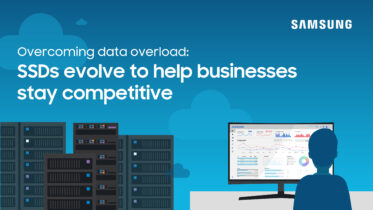Smartphones are quickly becoming the most important piece of technology we own. They are communication devices, cameras, messaging tools and they allow us to work more efficiently and with greater flexibility. The problem is that as smartphones become more integral to our lives, losing control of them and their data can be disastrous.
To avoid this, consumers and enterprises need to make sure they are utilizing the best possible data synchronization and data restoration techniques available — and that means looking to the cloud.
Cloud computing has slowly become the status quo. This increased rate of adoption is, in part, thanks to a rollout of services that are easy-to-use, secure and reliable, like Samsung Cloud. It also means that you’ll be seeing cloud technology become a part of your workflow if it isn’t already.
Data Synchronization in the Cloud
Samsung Cloud offers business users an easy and hassle-free way to backup the most important data on their smartphones. It means that if your device is lost, stolen or compromised by a cyberattack, you can quickly restore your data without having to worry about losing anything.
Samsung Cloud is available on its latest smartphones, including the Galaxy S8 and Galaxy S8+, allowing users to easily restore everything from your most important work files to your Wi-Fi settings just by logging into your individualized Samsung account.
Additionally, the service works across multiple devices, meaning you can link your Samsung tablet and will soon be able to link your notebook to your Samsung Cloud account and seamlessly access files and data on any of your devices. This system allows users to take a photo on their smartphone and have it instantly available on their tablet as long as they are using the same account.
Cloud Adoption Is Rising in Government Agencies
An increasing number of federal agencies are turning toward cloud solutions. Download Now
By utilizing these data restoration and synchronization features, users can ensure that their data is safe. Samsung Cloud gives all users 15GB of storage space for free, meaning they can get up-and-running without needing to buy additional storage.
The app automatically backs up all first-party Samsung apps, such as Calendar and Contacts, and saves settings like home screen layout, preferred Wi-Fi networks, passwords and even keyboard data. The service also backs up a large amount of other data, including phone call logs, clock settings (including alarms), apps (complete with APK, app data and app settings), messages, music and documents.
Samsung Cloud also gives users control over what data they backup. Each of the Samsung apps can be toggled on or off depending on whether the user wants to backup that app’s particular data. There are also granular controls over what data is shared, for example in the Gallery app, users can choose to sync all photos or just specific albums with other devices sharing the same account.
Getting the Most Out of Cloud
Putting your data in the cloud is more than just hardware and network settings. Here are a few tips to help you get the most out of your cloud backup system:
- Turn on automatic backup: Deciding to back up your data to the cloud is the first step to ensure your information remains secure. You could lose vital information if you forget to manually back up your data. This is where Samsung Cloud’s Auto Backup system comes in. When a user activates this feature, the smartphone will automatically upload information to Samsung Cloud via a Wi-Fi connection once every 24 hours, provided the device’s screen is off and it has been connected to a power source for at least an hour.
- Make security a priority: By using a cloud backup service for your device, you are already aware of the risks of not having data synchronization set up. But you also need to ensure where you are storing your data is adequately securing your information. Samsung Cloud promises that level of security by integrating with Secure Folder, allowing for data restoration and access to both work and personal files.
- Account for scalability: While smartphones today offer increasing amounts of built-in storage, the hardware is being outpaced by the rate we create content, whether it’s photos, videos, downloading large files or even creating presentations. So the need for a safe, secure cloud backup service is obvious, and so is the need for a service that can scale to meet your future needs as your content library grows. With Samsung Cloud, all users get an initial allocation of 15GB for free, but if that is no longer enough, users can easily choose to purchase 50GB or 200GB of additional cloud storage per month from Samsung, directly within the settings menu.
With business moving to the cloud at an almost accelerated rate, it’s essential to gauge what type of cloud applications could be most beneficial for your everyday work-life — so that you can ensure you’re as productive as possible — in the office and on the go.
See how enterprise mobility solutions are changing the way that employees work on a daily basis.








